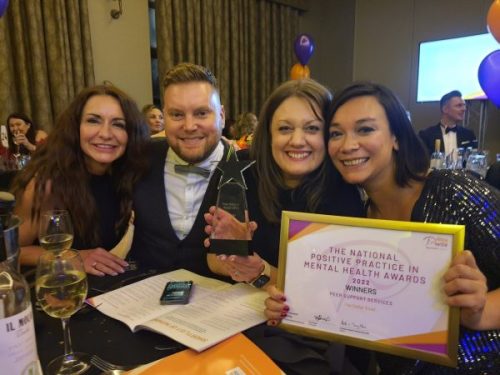The Cellar Trust wins prestigious national mental health award
The Cellar Trust has won The Peer Support Award 2022 at the National Positive Practice in Mental Health Awards.
The award recognised the essential role peer support has in mental health services and how The Cellar Trust uses this type of support to underpin its vital services.
The Cellar Trust has been delivering peer support since 2016 beginning with its crisis service: Haven and has continued to build on this through a range of services from the Safe Spaces to the Pathways to Employment Team, and the MAST which includes Peer Support Workers in Bradford Royal Infirmary and Airedale Hospital.
Peer support is a non-clinical form of support and involves people using their own experiences of mental health challenges to share understanding, hope and improved wellbeing with others. 96% of The Cellar Trusts clients said that peer support was an important part of the service to them. Building on its own positive experiences, The Cellar Trust charity also delivers accredited Peer Support Training and supervision to other organisations locally and nationally.
Speaking after the awards Kim Shutler, CEO at The Cellar Trust said:
“Peer Support has been fundamental to how we deliver our crisis support services, in hospitals and in the community. We know the huge positive impact it can have on individuals struggling with their mental health and wellbeing because, above all else, it gives people hope. It’s wonderful to be recognised with this award as we continue to provide this support to people when they need it most. The pandemic and the current cost of living crisis means people are really feeling the impact on their mental health. Having this kind of support available makes such a difference.”
Speaking of his experience joining one of The Cellar Trust’s peer support groups, Gary said:
“The one place I felt like I was actually listened to and taken seriously was my Peer Support Group. They helped me cope with all the stress, anger and negative emotions the more acute services were causing me. In particular, the way the group was led by the Peer Support Workers amazed me. I cannot express how much they have helped me and supported me in my progress.’


